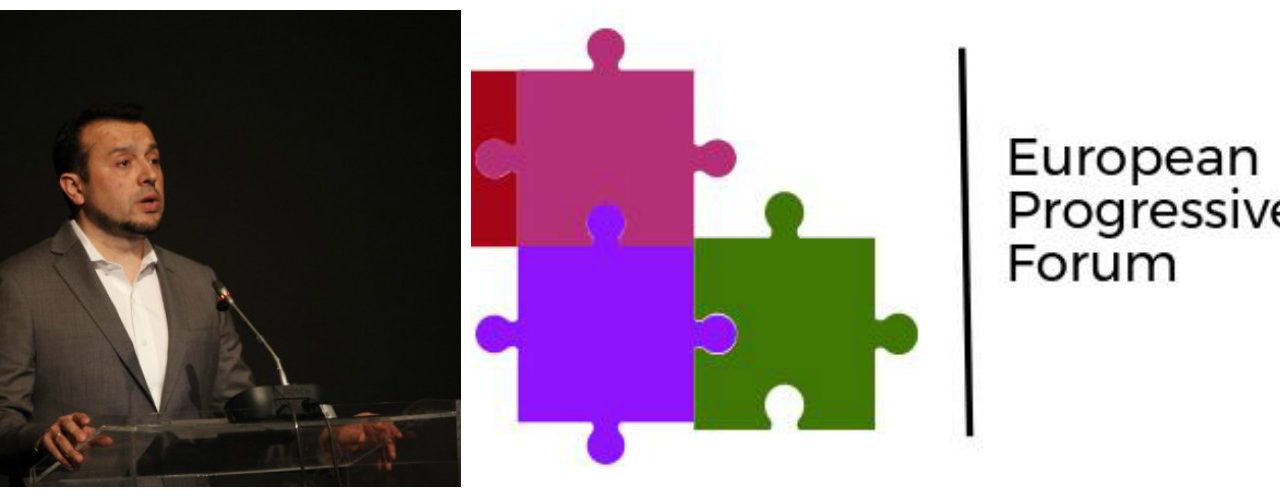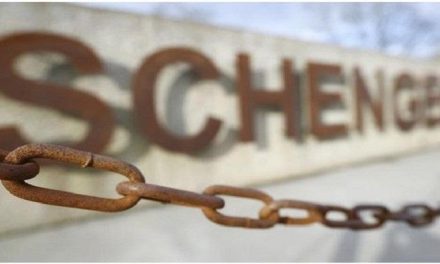Minister of Digital Policy, Telecommunications and Information Nikos Pappas spoke with the European Progressive Forum about the TV licensing process in Greece, the Novartis scandal, fake news and Greece’s online media registry, the government’s goals for the post-memorandum era as well as Europe’s need for “progressive alliances against the darkness of the exteme right and the opportunism of the markets”. Referring to social and political developments in Greece and Europe, minister Pappas posits the question: “Will social democracy remain an ally of the conservative right or will it contribute to this progressive effort? The left is ready. But what about social democracy?”
After three years of multiple burdens from different factors, TV licensing process in Greece is moving on. How difficult is to put an end to anomy in the media landscape?
Vested interests have fought hard against SYRIZA government from the very fist day in office, in order to block any effort to set specific rules in the media landscape after 30 years of anomy. We have worked against the odds, and now we can be certain that we are in the final process of getting rid of a toxic environment that the previous governments in Greece had let thrive enormously.Setting rules in the media landscape was one of our core policy pillars during our electoral campaign back in early 2015, and we stick to this commitment To that end, and to achieve our goals, we also had the valuable contribution from the National Council for Radio and Television (NCRTV).I have to admit that introducing a binding legal framework in the media landscape was something really demanding, but we also realized that our will and determination were stronger and we finally overcame these barriers. There is no more room for Greece to maintain a system that downsizes the importance of rules and procedures, and this is what we have to address in all aspects of our policy, like for instance in the labor rights.The TV licenses tender, that took place in late 2016, shown the real value of the TV product and turned down all those who believed that these licenses would be easily granted on the starting price. It also proved the limits of the domestic market in terms of the number of licenses: 7 licenses were auctioned, and we received 6 offers. This is important not only because we measured the limits and capacity of our market, but also because we proved that the previous governments did absolutely nothing on that field – and they did nothing on purpose.
Thus, our goal to regulate the market, make media entrepreneurs pay the price, and secure the labor rights of the employees was achieved.It is our government that managed to stop expansive deregulation in the media, against the will of our political opponents, securing also that each TV station will have at least 400 employees in its payroll. Its is also important to note that the tender also serves in the strengthening of media pluralism, abiding by the relevant constitutional provision, while at the same time the NCRTV is fully authorised to proceed to the licensing process. Last but not least, we have dealt with a vast corrupted network and cut illicit relations between media and political parties, i.e. relations that have significantly lowered trust of citizens vis-à-vis the media system.
The Novartis scandal has international dimensions, but in Greece the front opposition party of ND and a part of PASOK consider it a ‘government’s plot’. What is your opinion on that?
Novartis scandal is indeed a global scandal, and this is something we have observed in other countries as well, like Turkey, the United States, China and India. In Greece, ND pretends to see something different, a well-organized plot, orchestrated by PM Tsipras and FBI. It goes without saying that this huge scandal is real, and its impact on the bankruptcy of our economy is immense, even if the opposition denies to see the truth. Someone could expect that the political forces that have ruled Greece over the last 40 years would have the courage to assume the political responsibility of this scandal. Nonetheless, in a last plenary of the Greek Parliament on that matter, these parties did not even refer to the fact that such scandals in the pharmaceutical and health sector have left 2,5 million people without health insurance, completely deprived from free access to primary health sector.SYRIZA government cannot hide Novartis scandal nor avoid shedding light on the immense responsibilities of the political personnel that was involved on that. We have to do our best, in the context of our power, to increase transparency and empower social justice. We are in the middle of the investigation and we are determined to abide by the judicial procedures, showing our firm support to the inquiry committee of the Parliament that is about to examine the political responsibility of the former Heath Ministers and Prime Ministers involved in the scandal.
The frequency of fake news is rising daily, both in Greece and abroad. Is it feasible to control and criminalize this phenomenon effectively, through a legislative initiative?
As early as 1988, Chomsky and Herman wrote about the construction of consensus and the way in which US media formed and monopolized public opinion. Today anyone can say anything and this can be spread everywhere. There are many recent surveys that prove that people are watching and reading news that better fit their interests, beliefs and feelings.It is no coincidence that the editorial team of the Oxford British Dictionary chose “post-truth” as the word of the year for 2016. A term that concerns the public debate as a whole and serves a specific agenda – i.e. the so-called Pirandello’s agenda “it is like that, if this is what you think.”Especially in Greece, during the last three years, fake news have been following the same route. They appear in social media, then in the websites, ending up in the TV news.
Meanwhile, in the European Union, Commissioner for Digital Economy and Society, Mariya Gabriel, who visited Athens few months ago and congratulated us on our action, has taken the initiative to fight fake news by setting up a group of experts to deal with them. A public consultation on this issue is underway, and a comprehensive law on the dissemination of fake news is also being discussed. We have already proceeded to set up the online media registry.For the first time, transparent and structured accountability is attempted, as suspicious or blurred ownership status websites are excluded from state advertising. So far, more than thousand sites have been registered to the emedia.media.gov.gr. We are already in talks with Google and Facebook, and our country will be the second on in EU, after Italy, where a full-scaled, public awareness campaign will be launched to address false news.
In addition, a working group with the Justice Minister has been already set up and a bill is being considered to tackle the crime stemming from hate speech and the misappropriation of false news. We are in contact with the European Union and we are in a position and readiness not only to implement a European directive, but also to co-design it on the basis of the material we have collected so far.While pages that control the accuracy of events are emerging across the European Union, it is clear that in Greece we are significantly behind this and the existing pages are not enough. And how they can be adequate when opposition parties reproduce – intentionally or not – fake news?
Indicatively, one of the two vice-presidents of ND party has even invoked news from a humorous website that wanted the then Minister of Education Nikos Filis to abolish the vowels from the Greek language…Fake news are not only reproduced by politicians, but also by media channels. A nationwide channel news bulletin showed a graphic that had been turned over to prove that during SYRIZA governance recession has been increased, while the truth is that there was growth. I showed this upside-down chart at the Global Progress Forum in Canada where I participated in a panel on “Democracy for the Digital Age,” along with Arianna Huffington, founder of Huffington Post, Reid Hoffman, co-founder of Linkedin and Steve Huffman, social networking consultant at Reddit, and they really laughed at the “inventiveness” of the TV channel.
The online media registry is therefore a first step towards accountability and transparency. Not because we want to control journalism or its content. We believe that we need a kind of journalism that does not serve vested interests, but it functions as a democratic tool to control powers. Our goal now, after its success, is to encourage, and I stress, to encourage Internet publishers, to control the content themselves and to suggest possible violations. Journalists themselves, in line with the major European initiatives, such as the French CrossCheck Platform, detect fake news and alert citizens and the state.We are also discussing a unified portal beyond the free software we already provide to registrants to cope with the copying of unauthorized content that will help to cross-check the events.In the age of post-truth, journalism becomes valuable. And it is up to us all to support it so that it can fulfill its social role. And we do this in a coordinated and coherent way.
In August 2018 Greece officially exits bailout programs. What are the main goals of the government for the post-memorandum era?
The exhaustive negotiations with the institutions end in August 2018. As they ended – let’s not forget – January 2015 the raids of arrogant technocrats at the ministerial offices in Athens. After August there will be more space to implement our own-crafted policy. Our policy goals will be achieved, and we will succeed to win our “battles” – the ones that we have managed to win even within the context of the third program.For the first time, a program is being completed without new measures, interest rates are at historically low levels and the economy is recovering, as shown by specific figures: 2% growth, 6% unemployment reduction, 320,000 new job creation, and more.Regulated budgets, growth dynamics, and the European “umbrella” that we achieved to effectuate on debt relief, create a climate of confidence, cutting interest rates despite the fact that specific group interests want to undermine this smooth course. After August 2018, we will not be automatically transferred to the “Promised Land”, but we will be able to walk more freely on our own path and contribute even more to the debate on the future of Europe. Exiting the memoranda will provide more “room” for policy-making. And the benefits of enhancing education, upgrading health and providing access to everyone, I have to tell you that such issues have been already dealt efficiently within the current program.At the same time, we are building a new state, free from clientelistic practices. Even before the program is over, we are proceeding with actions that bear the signature of the Left, something we have been already implementing since 2015.Now we are planning the post-memorandum era.
The regional conferences for the productive reconstruction of the domestic economy that have been held so far and those that follow are not part of a show. The proposals tabled by the local actors, the people who know and identify the needs of each region, are willing to participate to the plan for the next day. The composition of this new project includes the voice of every citizen. And this project concerns every citizen. For us, no one is and should be left aside. And our own plan of successive reforms will be the one that sets a new era for Greece.
How do you see the course and the future of Europe?
It is now imperative to overcome the political, social and institutional deficit in European economies and societies. The same must be done at institutional level as we are in danger of witnessing again the most horrible moments of the continent and the revival of new nationalisms.Politics must be out at the core of the debate to avoid Austria-like phenomena, i.e. a more sophisticated version of neoliberal absolutism without social reflexes.Progressive forces must live up to the ongoing challenges in order to bring about a social Europe. Europe needs to show that has learned from the mistakes of the past. Here lie the responsibilities of social democracy, which has been removed from the left and therefore plunged into the greatest crisis since its birth.In recent decades, social democracy has been attached to a neo-liberal consensus that is reflected in country-specific policies. From the deregulation of labor relations, the shrinking of social state and the over-indebtedness of the public and private sectors, to the rules and conditions of the Stability and Growth Pact – all these developments have led to this giant financial crisis for the EU economies and have nourished stong anti-establishment feelings.The debate about the future of Europe has opened, and there is also a productive critique, not only from the left. The strategic choice of deregulation, to which – unfortunately – social democrats have agreed to cancel their own post-war legacy, is now questioned by a large part of this progressive political spectrum.
The social state, the powerful unions, the mass parties and the political freedoms, all those projects had brought social democracy to a hegemonic power.We do not raise our finger to social democracy, but we call for a big alliance with the left, the greens and other progressive movements. An alliance that will fight for the European unemployment benefit, for an increased EU budget or for a joint European Finance Minister and Minister for Social Affairs.An alliance that will strengthen the European Parliament, that will rise its stature and will not leave the member-states alone, to the speculative ‘appetites’ of vested interests that do not want a European solution on public debt issue.Europe can only survive with progressive alliances against the dark-right-wing politics and the opportunist markets. Societies are moving forward, the question is whether social democracy will remain an ally of the conservative right or contribute to this effort. The left is ready. But what about the social democracy?
Source: European Progressive Forum: N. Pappas: Progressive alliances to save Europe
Read also via Greek News Agenda: Progressive Europe needs great alliances to block the road to isolationism
I.L.














